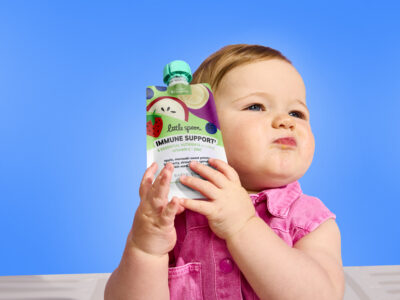Life with a newborn can feel like a whirlwind of counting ounces and measuring bottle sizes. I often hear parents agonizing over how many more ounces they need to get in that day, or worrying about pureé portion sizes. Sound familiar? In a land of endless opinions and approaches, even the savviest parent can feel overwhelmed. But here’s the bottom line, most babies will meet their calorie needs without much pressure from us and will make their needs known when it comes to being fed.
How many calories does my baby need everyday?
Here’s where it gets tricky, babies and toddlers need varying amounts of calories to achieve the right amount of weight gain for their own bodies. A baby may take 6oz per feed and another take 3oz; an 18-month-old eats half a plate and another ¼ of a plate, but all may very well be getting just the right amount. As long as growth is consistently on target, baby is getting what they need. If baby is gaining an appropriate amount of weight at check ups, then nutrition and overall calories are likely to be just right.
Poops and pees.
Another way to ensure baby is getting the nutrition they need? Poops and pees. Yup, you read that right. Babe should have at least 4 wet diapers in a 24 hour period. Anything less, check with your pediatrician to assess concern for dehydration. Baby poop is a bit less straightforward. Many formula fed babies will go a week without a bowel movement while some breastfed babies will poop with each (and even between) feeds. Both are actually totally normal! If baby is having hard or bloody poops, this may be a sign that baby is not getting all of the fluid they need and a good time to check in with your pediatrician.
“But, how do I know if my baby is gaining enough weight?!”
Short answer: growth charts. If you’re confused by the lines, dots and percentages, you’re not alone. So often growth charts are the biggest cause of stress after a check up. Here’s what you *really* need to know:
Baby growth
From 0-24 months, the AAP recommends tracking growth in 0-24 month olds using the WHO Growth Chart. Using their actual weight, a dot is placed on the chart landing them on a certain “percentile” ranging from below zero to 99. However, the actual percentage doesn’t matter. In fact, it tells us very little about the child’s overall growth. It’s actually the trajectory, or the direction of the curve, created by several of those plots over time that tells us how the child is growing. Some babies will grow along the 5th percentile and others along the 99%ile, and everywhere else in between. If those dots stick roughly (there’s wiggle room!) around the same percentile with each check up, growth is considered to be on target. In fact, one of my kiddos (mom of 3 here) has never reached above the 5th percentile line, but has consistently tracked along his own curve. And from one mama to another, good things come in all different sized packages 😊.
Toddler growth
At 2 years old, most clinicians will switch your kiddo over to a new growth chart, using the CDC Growth Chart for 2-20 years old. At this age, expect growth to slow down a bit. The rapid growth needed in infancy is no longer necessary. But cue the picky eating, snotty noses and food throwing phases, all of which can impact weight gain slightly. But no need to panic, toddlers are built to withstand these ebbs and flows in calorie intake without any significant harm to their growth.


